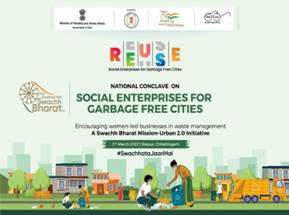Swachh Bharat Mission-Urban 2.0, under the aegis of the Ministry of Housing and Urban Affairs, has launched the ‘National Behaviour Change Communication Framework for Garbage Free Cities’ to strengthen the ongoing jan andolan for ‘Garbage Free Cities’. The focus of SBM-U 2.0 is to scale up inter-personal communication, mid-media activities, etc.
Under the SBM-U 2.0, the newly launched ‘National Behaviour Change Communication Framework for Garbage Free Cities’ shall serve as a guiding document and blueprint for States and Cities to undertake large scale multimedia campaigns along with intensive and focused inter-personal communication campaigns.
At the core of the Mission lies the central belief that ‘swachhata is everyone’s business’ and clear, consistent, and repetitive messaging around this core message has been done tirelessly over the years, through the use of traditional, digital, social media campaigns and large-scale interpersonal communication to ingrain this belief in the minds of all citizens.
Launched by Manoj Joshi, Secretary, Ministry of Housing and Urban Affairs (MoHUA), Government of India, the framework focuses on intensifying messaging around the key focus areas of source segregation, collection, transportation, and processing of waste, plastic waste management, and remediation of legacy dumpsites to truly transform the urban landscape of India.
Urban India has seen a social revolution in the field of sanitation, with 130 crore citizens rallying behind the Prime Minister’s clarion call for ‘Clean India’ to become a developmental priority. Since15th August 2014, the Government’s policy for cleanliness has metamorphosed to become the world’s largest behaviour change programme that champions the principles of sustainable urbanization, circular economy, Reuse, Reduce, Recycle, as well as the United Nations Sustainable Development Goals.
As a consequence of SBM-U, the idea of Swachhata is now ingrained in the minds of citizens with diverse citizen groups coming together to take ownership of their city’s cleanliness status and visibly improve it.
Sector partners and specialists in the field of behaviour change communication added nuanced perspectives to the discussion. Ms. Radharani Mitra, Global Creative Advisor from BBC Media said, “A 360-degree approach to communication ensures more exposure to the content, with the same idea implemented across different touchpoints, thus helping to raise awareness, change attitudes, generate conversations and increase intent to act.”










